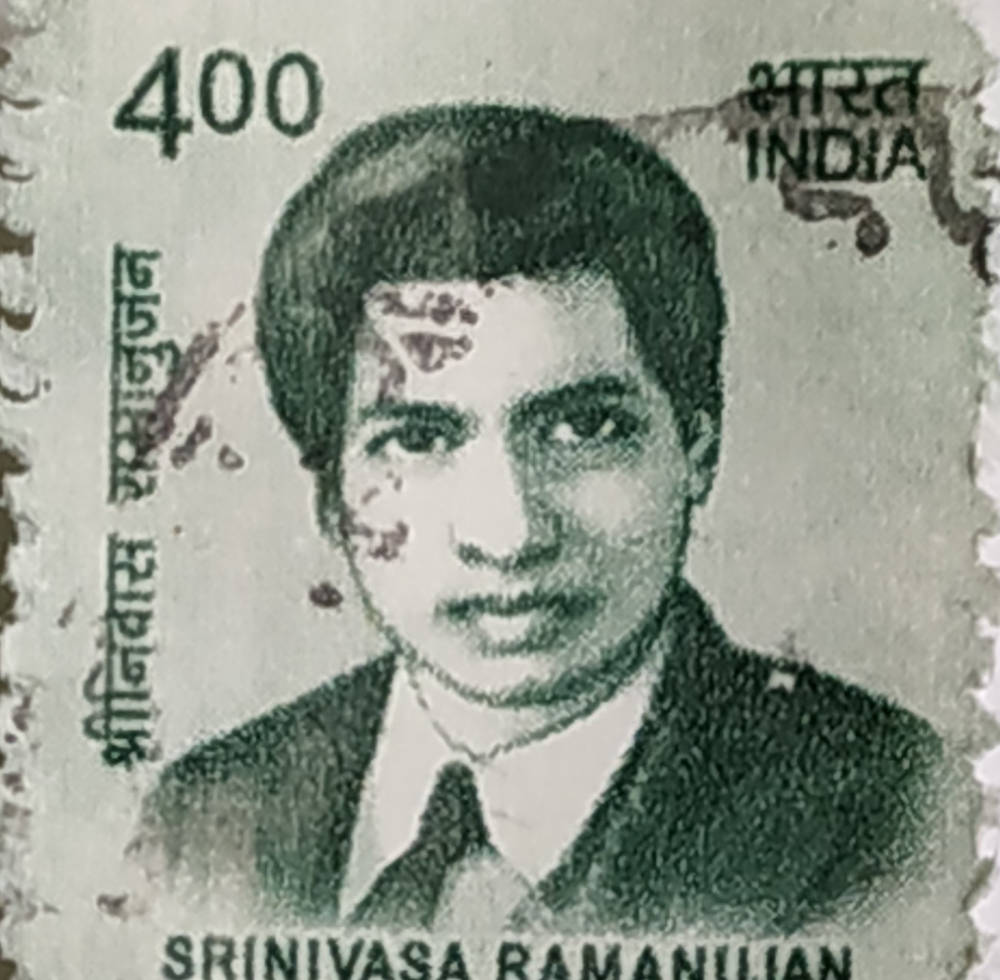[By P. L. Tandon (CC BY-NC-SA 2.0), via Flickr]
Good morning,
In Incarnations: India in 50 Lives Sunil Khilnani, who is best known for his book The Idea of India talks about the mathematical genius Srinivasa Ramanujan.
He writes, “It is a story suitable for novels, documentaries, films, or inspirational TED talks: the tale of a deeply religious savant and college dropout ostensibly rescued from a South Indian village and brought to Cambridge by the mathematician G. H. Hardy, the recipient of Ramanujan’s letter. After a few years burning bright, Ramanujan died young, his greatest potential perhaps unrealized. The narrative (cut with various quantities of exoticism and the miraculous, depending on the teller) even involves some lost notebooks, dramatically rediscovered, and a cryptic but ultimately revelatory final letter.
“In other, similar stories, math is often merely a backdrop. Yet Ramanujan’s work today is recognised as a frontier in advanced mathematics. (“Shiver in ecstasy,” a scientist recently tweeted of a connection Ramanujan made between infinite series, continued fractions, e, and pi.) It has proven integral to our highly networked and encrypted digital lives, as well as to cutting-edge attempts to cure cancer and to understand the deepest structures of the universe. Every day, researchers across the world, aided in part by those so-called lost notebooks and Ramanujan’s last letter, are sweating to find more applications. Did he hold the key to quantum gravity, which could unlock “a unified theory of everything?” another scientist recently wondered.
“Many questions such as that, about the significance of Ramanujan’s work, could not have been asked during his lifetime."
Later on in the chapter, Khilnani shares his view on why mathematicians still hold him in awe. He writes:
“If his significance went largely unnoticed in Ramanujan’s own day, it’s not just that his formulae were gnomic: he was answering questions that wouldn’t be asked for decades, or even a century after he died, in areas of mathematics that people didn’t even know were important. It’s as if he described the alien inhabitants of a distant planet two generations before we knew the planet existed.”
ICYMI: In his comment to Harsh Vardhan's essay on Tata Neu, Srikanth Rajagopalan shared his analysis: “Tata Neu is simply an aggregator, not an app. Tata Pay is nth payment app in an industry with no revenue streams thanks to the zero MDR regime. I can't see the additional wow factor of having an “in-house” payment app vs plugging in a provider like razorpay.” You can read his full comment right below Harsh Vadhan's article.
Have a good day!
The BJP and Muslim equation
Over the last few months, we have been watching how the uneasy relationship between the ruling BJP and Muslim community is getting uneasier. While this relationship was never an easy one, it has perhaps reached a point of no-return, Asim Ali argues in The Telegraph. This does not bode well either for the BJP’s political fortunes or for India in the longer run for two reasons.
The first, he points out, is that with fringe elements indulging in violence against Muslims and with the ruling party not seen as taking action against them. “The BJP is weakening the State by voluntarily ceding its monopoly on violence and might find it difficult to reassert control over these mushrooming, radicalised gangs. The BJP might have had to countenance little political cost in demonising Muslims but a descent into large-scale violence or societal chaos might start repelling Hindus, especially if it begins to affect Hindu lives and livelihoods.”
The second reason Ali says lies on the international stage. “The BJP government would never be able to credibly sell India’s image as a peaceful and tolerant democracy, or deepen its partnerships with the West or the Middle East, if it does not stop brutalising Muslims in India.”
Ironically though, there is research from the ground that shows “In most elections, between 5-10 percent of Muslims have been shown to vote for the BJP, mostly out of concerns of political patronage.” While it is tempting to conclude from this data that an alliance between the Muslims and BJP in the longer run is possible, Ali believes it will not happen for various reasons. This includes the fact that “there is no other community that can take the place of Muslims as targets for majoritarian mobilisation.”
His prognosis is a grim one and we’d like to hear what you think about the current state of affairs.
Dig deeper
The shortness of life
How are we to think about our time, life and relationships with others? This question occurred on reading a Twitter thread by @punk6529 who mostly posts on all things crypto.
“Most of my friends from high school lived (and live now) in different cities than I do.These are friends that I had spent every day with in high school and some I even lived with in my first years in New York. We are still super close, I think of them as ‘best friends’
“And I feel that we have all the time in the world. Sometimes they come for business to my neck of the woods, sometimes for pleasure, sometimes I am in their neck of the woods.
“Sometimes we manage to meet up, sometimes we don't. Everything is fine, very normal, very nice.
“But one day I ran the numbers.
a) I have hung out with a typical one of these, say, 1,500 in times in my life (mostly in school)
b) we were managing to sync up our travels, say, once every 12 to 24 months.
“It is mathematically certain now that about 99% of the time I will ever spend with them, in the rest of my life, I have already done so. It does not matter if I see them another 10 or 20 or 50 times, it is trivia in the scheme of things.
“Prior mental framework was ‘my boy is in town, maybe we can grab drinks if our schedules allow, if not, no problem, next time’
“New mental framework is: ‘tonight is one of your last 30 times you can see one of your best friends in your life’”
His full thread can be read here.
It is inevitable then that we ask questions about how are we to think about the finiteness of time. The writer and blogger Time Urban placed this in perspective through an essay and lovely visuals. Such as this one below.

(Image via Tim Urban on waitbutwhy.com)
Dig deeper
- Your life in weeks (Tim Urban)
How things evolve

(Via WhatsApp)
Found anything interesting and noteworthy? Send it to us and we will share it through this newsletter.
And if you missed previous editions of this newsletter, they’re all archived here.
Warm regards,
Team Founding Fuel


